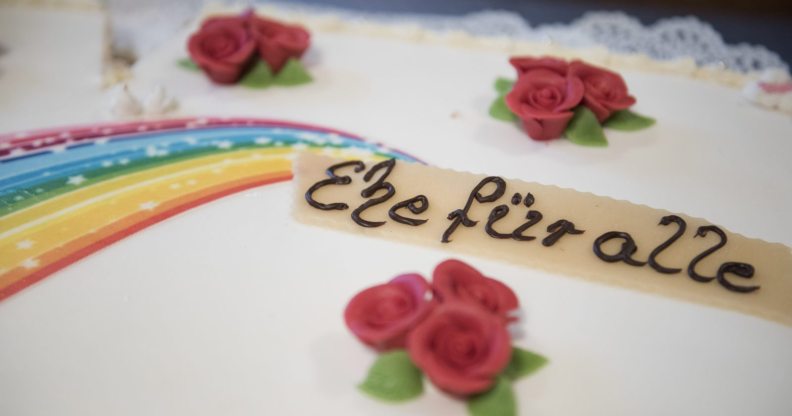German politicians abandon legal bid to reverse equal marriage

The wedding cake of Karl Kreile and Bodo Mende during their wedding at Schoeneberg district townhall on October 1, 2017 in Berlin, Germany. It was the very first wedding after new law “Ehe fuer alle” (wedding for everyone) in Germany. Kreile and Mende met each other in 1979 and lived in a same-sex union since 2002. (Photo by Steffi Loos/Getty Images)
Politicians in Germany have abandoned a planned legal challenge seeking to reverse same-sex marriage.
Same-sex weddings began in Germany last year after the country’s conservative Chancellor Angela Merkel – an opponent of same-sex marriage – agreed to allow a bill to pass through the country’s Parliament to appease liberal lawmakers.
The decision angered the right-wing regional government in the state of Bavaria, which said it was planning a legal challenge.
The CSU officials, whose party is the regional sister party of Merkel’s CDU, claimed that same-sex marriages would actually require a drawn-out process including changes to Germany’s constitution.
However, the court case was quietly abandoned by the state this week, in a concession that it stood little chance of succeeding.

Same sex wedding figures stand on a table after the first wedding after new law ‘Ehe fuer alle’ (wedding for everyone) in Germany at Schoeneberg district townhall on October 1, 2017 in Berlin, Germany.(Photo by Steffi Loos/Getty Images)
A 152-page legal document, compiled by legal expert Prof. Dr. Ferdinand Wollenschläger, had assessed the possiblity of a legal challenge against the rulling.
However, Bavaria’s State Chancellor Marcel Huber and Justice Minister Winfried Bausback concluded there was little chance of success – and announced the challenge would be shelved after a cabinet meeting.
According to German-language newspaper the Münchner Merkur, Bausback said: “After an overall assessment, the prospects of bringing an action before the Federal Constitutional Court are considered to be low.”
Huber insisted that the state still believes in the definition of “traditional marriage” as a partnership between a man and a woman, but would shelve its legal challenge
Officials added experts “found no legally binding argument that the marriage law violates the constitution”.

(Getty)
Chancellor Angela Merkel gave her Christian Democratic Union party a free vote on equal marriage when it passed through Parliament – though Mrs Merkel herself voted against the legislation.
She recently revealed that meeting a lesbian couple who had eight foster children together changed her mind on LGBT rights.
Merkel said: “I had a life-changing experience in my home constituency.”
She told the audience that she had been invited to dinner with a lesbian couple who were looking after eight foster children.
The Chancellor saw that the children were well cared for, and realised that her beliefs, and those of her party, were unfounded.
“If the youth welfare service entrusts a lesbian couple with eight foster children, then the state could no longer use child welfare as an argument against adoptions.”
However, some questioned whether Merkel’s story was a distraction to sidestep the alternative: that widespread pressure has made it politically impossible for her to resist any longer.
Thomas Jaeger, a political scientist at Cologne University, saidL “Merkel switched her position now to prevent the [political opposition] from attacking her on it in the campaign.”
She had previously refused to bend to the popular tide, saying: “For me, marriage is a man and a woman living together.”

